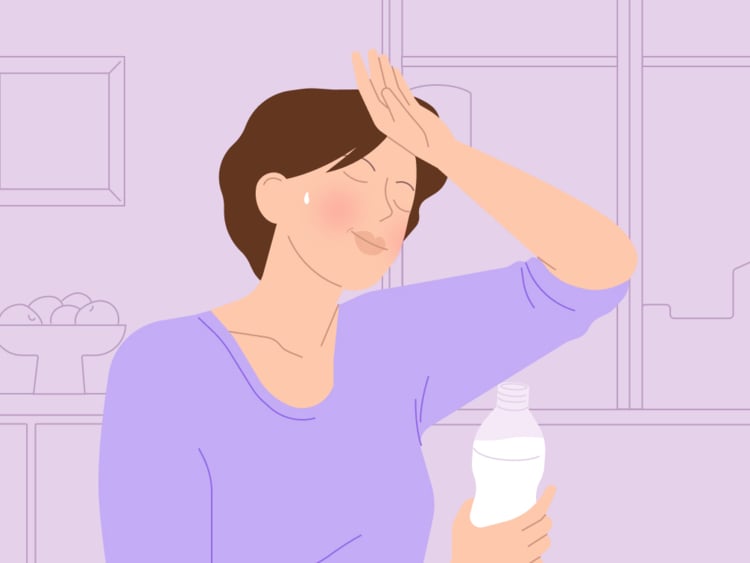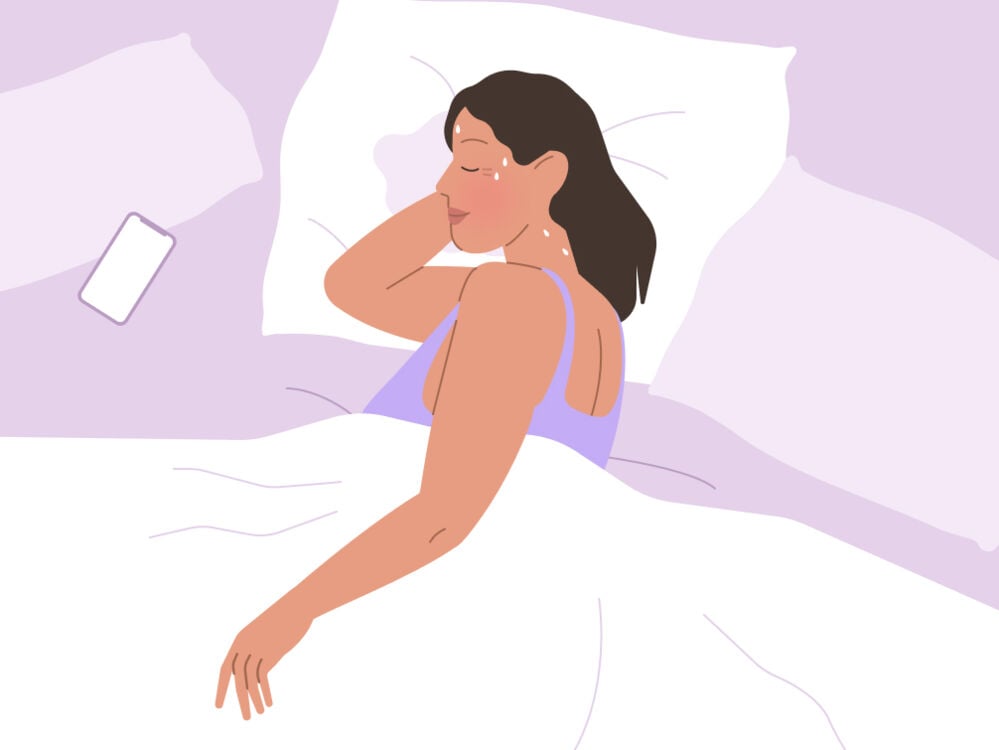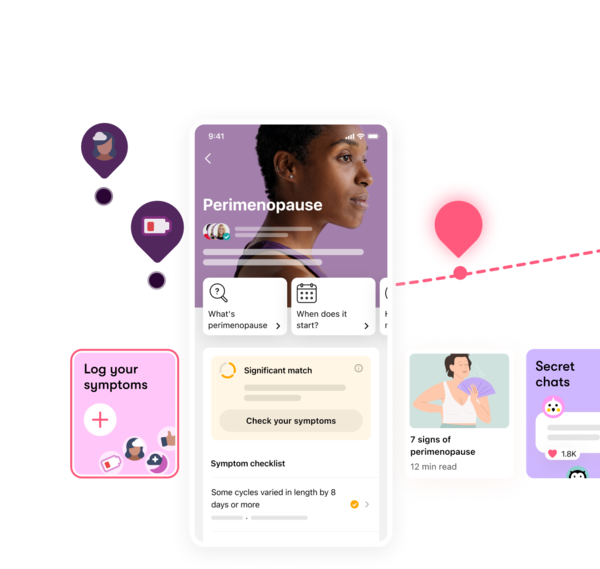Are you suddenly burning up? It could be hot flashes, a common symptom of perimenopause. Here’s what you need to know.
-
Tracking cycle
-
Getting pregnant
-
Pregnancy
-
Help Center
-
Flo for Partners
-
Anonymous Mode
-
Flo app reviews
-
Flo Premium New
-
Secret Chats New
-
Symptom Checker New
-
Your cycle
-
Health 360°
-
Getting pregnant
-
Pregnancy
-
Being a mom
-
LGBTQ+
-
Quizzes
-
Ovulation calculator
-
hCG calculator
-
Pregnancy test calculator
-
Menstrual cycle calculator
-
Period calculator
-
Implantation calculator
-
Pregnancy weeks to months calculator
-
Pregnancy due date calculator
-
IVF and FET due date calculator
-
Due date calculator by ultrasound
-
Medical Affairs
-
Science & Research
-
Pass It On Project New
-
Privacy Portal
-
Press Center
-
Flo Accuracy
-
Careers
-
Contact Us
Hot flashes in perimenopause: Why they happen and how to deal


Every piece of content at Flo Health adheres to the highest editorial standards for language, style, and medical accuracy. To learn what we do to deliver the best health and lifestyle insights to you, check out our content review principles.
Do you feel like some joker has cranked up your inner thermostat, and you’re getting sudden, uncomfortable waves of heat in your body? Hot flashes — one of the most common symptoms of perimenopause (aka the transition to menopause) — might be to blame.
First up, let’s start with a biology lesson. You might have heard of menopause (and menopausal symptoms) but not perimenopause. Confusingly, the terms are often used interchangeably, but they’re actually two different things. Perimenopause is defined as the years leading up to menopause (your last period). You're diagnosed as having gone through menopause when you haven’t had a period for 12 months (usually between the ages of 45 and 55). From then on, you are postmenopausal.
However, this process doesn’t happen overnight. Perimenopause, or the menopausal transition, can last years, beginning anytime between your late 30s and 50s (but most commonly occurring in your 40s). You might experience symptoms such as hot flashes, brain fog, and irregular periods, which are all caused by hormonal changes.
Just a note: While hot flashes can be due to a wide range of other things, such as a thyroid problem or medication side effects, this article focuses on hot flashes in perimenopause. Let’s dive in.
Key takeaways
- A hot flash (or hot flush as they’re sometimes known) is a sudden sensation of heat in your body. It’s usually most intense in your upper body, including your face, neck, and chest.
- Up to 80% of women in perimenopause get some level of hot flashes.
- There are treatment options out there — so there’s no need to suffer in silence if they’re messing with your life.
Take a quiz
Find out what you can do with our Health Assistant
What is a hot flash?
“Hot flashes [and night sweats] are also known as vasomotor symptoms, and they’re where you get a sudden feeling of heat creeping through your chest, neck, and face,” says Dr. Ruth Arumala, an obstetrician and gynecologist in Texas, US.
Hot flashes are a common symptom of perimenopause — in fact, more than 80% of women get them. If you get hot flashes at night, they’re called night sweats.
When do they start?
Because perimenopause usually starts between the ages of 45 and 55, this is when you could expect to start experiencing hot flashes. But for some people, perimenopause — and, therefore, hot flashes — can happen earlier, in their mid-30s.
How long do they last?
Good question. A hot flash can last anywhere between 30 seconds to five minutes.
You’re most likely to experience hot flashes during perimenopause before they ease off sometime after menopause. In a 2015 study of 291 US women, it was found that hot flashes for most women peaked during late perimenopause and got better two years postmenopause (the time after you’ve been through menopause). You might have more hot flashes toward the end of perimenopause before they peak around a year after your final menstrual period.
And how long in your life can you expect to deal with them? Hot flashes tend to last for an average of four to five years, but a small number of women may experience them for the rest of their lives. “Some people, particularly Black women, tend to have them for a greater number of years. And some women might have an occasional hot flash for the rest of their lives,” says Dr. Arumala. This time frame might sound overwhelming, but keep in mind that treatment options are available; we’ll have more information on those later.
What can trigger hot flashes or make them worse?
Some factors might make hot flashes more likely, such as:
- Smoking
- Being overweight
- Race — Black women tend to report hot flashes more than women of other races
If you’re wondering about hot flash triggers, here are some factors that might set them in motion:
Some women also report that alcohol is a trigger. But, as Dr. Arumala points out, “There doesn’t always need to be a trigger. Sometimes, a hot flash happens without one.”
What do hot flashes feel like?
A hot flash usually feels like a quick burst of heat in your body.
Dr. Arumala has the details: “You might become red and flushed in your face and neck, especially if you’re light-skinned. You might sweat, and you might feel like your heart’s racing. Some people notice a cold chill right afterward.” You could get all or some of those symptoms.
One Flo Secret Chats member describes feeling like they’re “spontaneously combusting” during a hot flash. Another says: “I was with a client, and the heat overcame me, and sweat just poured down my face.” If you’re having similar experiences, then remember that you’re not alone, and treatment is available.

Hot flash relief: What helps?
If your hot–cold roller coaster is messing with your life, there are some things you can do to relieve hot flashes. These steps can help stop them in their tracks and help you manage in the midst of a melting moment.
Self-help for hot flashes
- Dress in layers. That way, you can easily remove items if a hot flash comes on.
- Carry a portable fan. It will help you keep cool.
- Choose your drinks wisely. Go for cold drinks and limit alcohol and caffeine. “We don’t know exactly why alcohol and caffeine are triggers, but it can definitely help to cut them back or out,” says Dr. Arumala.
Ways to reduce the risk of hot flashes
- Quit smoking. The exact way in which smoking affects hot flashes isn’t clear, but Dr. Arumala says, “Smoking ages the ovaries, so quitting smoking may affect the way you experience perimenopause symptoms.”
- Manage your weight (if you want to). Experts suggest that if you’re overweight or obese, losing weight can help to reduce hot flashes.
Medication for hot flashes
Hormone therapy (HT) is the most common and effective treatment for hot flashes and night sweats. HT (also known as hormone replacement therapy) can help to reduce the symptoms of perimenopause, including hot flashes and night sweats, by boosting your levels of hormones, which naturally dip during this time.
There are also nonhormonal medication options for trying to manage hot flashes, including:
- Some antidepressants
- An epilepsy drug called gabapentin
- Fezolinetant, an oral medication, which has recently been approved by the US Food and Drug Administration for treating hot flashes
Are you wondering about natural remedies for hot flashes? Some research suggests that techniques such as cognitive behavioral therapy might give some relief. Just remember that it’s always best to speak to your doctor before starting any new medications or therapies.
"We don’t know exactly why alcohol and caffeine are triggers, but it can definitely help to cut them back or out"
When to see your doctor and what to say
Hot flashes can be uncomfortable and make day-to-day life more stressful. But the good news is that your doctor can help, so you should make booking in with them a priority.
It might help to prep for your appointment by making a list of any other symptoms you’re experiencing and any treatments you’ve tried to relieve them. You might also want to ask your doctor questions, including whether you’ll need any tests, what treatment options are available, and what else you can do to help to reduce your symptoms.
During the appointment, your doctor can figure out what’s going on, talk you through the different treatment options available, and provide the support you need.
More FAQs
How many hot flashes a day is normal?
Here’s the thing: There’s no “normal” number of hot flashes. You might get them several times a month, but for other people, they happen a few times a day — there’s no one-size-fits-all pattern.
What hormone is lacking in hot flashes?
It’s not a lack of hormones; it’s due to a fluctuation of hormones. “During perimenopause, your estrogen production is erratic,” says Dr. Arumala. And it’s those seesaw hormones that can bring on symptoms like hot flashes.
It’s thought that estrogen and serotonin (the “feel-good” hormone) are involved in the thermoregulation of the brain (in other words, the mechanism that helps maintain your body temperature), but more research is needed to determine the link.
Are hot flashes bad for your brain?
In the short term, no. As Dr. Arumala says: “You’re having issues with regulating your internal body temperature, and hot flashes are your body’s way of trying to cool you down.”
However, if left untreated, hot flashes can put you at a higher risk of developing cardiovascular disease in the future. So if you’re experiencing them, it might be best to book an appointment with your health care provider.
Can stress cause hot flashes?
Absolutely, stress can be a trigger for a hot flash. As Dr. Arumala says: “Stress can also affect the frequency of hot flashes, but more research is needed.”
While you can’t eliminate stress from your life (if only!), you can definitely take steps to manage how you deal with it. Some general stress management tips include practices such as deep breathing, yoga, mindfulness, eating well, exercising, and getting enough sleep.


Hey, I'm Anique
I started using Flo app to track my period and ovulation because we wanted to have a baby.


The Flo app helped me learn about my body and spot ovulation signs during our conception journey.


I vividly
remember the day
that we switched
Flo into
Pregnancy Mode — it was
such a special
moment.
Real stories, real results
Learn how the Flo app became an amazing cheerleader for us on our conception journey.
References
Bansal, Ramandeep, and Neelam Aggarwal. “Menopausal Hot Flashes: A Concise Review.” Journal of Mid-Life Health, vol. 10, no. 1, Jan.–Mar. 2019, pp. 6–13, doi.org/10.4103/jmh.jmh_7_19.
“Drink to Your Health at Menopause, or Not?.” The North American Menopause Society, www.menopause.org/for-women/menopauseflashes/exercise-and-diet/drink-to-your-health-at-menopause-or-not. Accessed 6 Oct. 2023.
“FDA Approves Novel Drug to Treat Moderate to Severe Hot Flashes Caused by Menopause.” US Food and Drug Administration, 12 May 2023, www.fda.gov/news-events/press-announcements/fda-approves-novel-drug-treat-moderate-severe-hot-flashes-caused-menopause.
“Hot Flashes.” Cleveland Clinic, my.clevelandclinic.org/health/articles/15223-hot-flashes. Accessed 6 Oct. 2023.
“Hot Flashes.” Mayo Clinic, 20 May 2022, www.mayoclinic.org/diseases-conditions/hot-flashes/symptoms-causes/syc-20352790.
“Hot Flashes: What Can I Do?” National Institute on Aging, www.nia.nih.gov/health/hot-flashes-what-can-i-do. Accessed 6 Oct. 2023.
“Menopause.” World Health Organization, 17 Oct. 2022, www.who.int/news-room/fact-sheets/detail/menopause.
“Menopause: Symptoms.” NHS, www.nhs.uk/conditions/menopause/symptoms/. Accessed 6 Oct. 2023.
“Menopause and Your Heart.” British Heart Foundation, www.bhf.org.uk/informationsupport/support/women-with-a-heart-condition/menopause-and-heart-disease. Accessed 6 Oct. 2023.
“Menopause: Things You Can Do.” NHS, www.nhs.uk/conditions/menopause/things-you-can-do/. Accessed 6 Oct. 2023.
“Menopause FAQS: Hot Flashes.” The North American Menopause Society, www.menopause.org/for-women/menopause-faqs-hot-flashes. Accessed 6 Oct. 2023.
Mitchell, E. S., and N. F. Woods. “Hot Flush Severity during the Menopausal Transition and Early Postmenopause: Beyond Hormones.” Climacteric: The Journal of the International Menopause Society, vol. 18, no. 4, Mar. 2015, pp. 536–44, www.ncbi.nlm.nih.gov/pmc/articles/PMC9668206.
Nappi, Rossella E., et al. “Global Cross-Sectional Survey of Women with Vasomotor Symptoms Associated with Menopause: Prevalence and Quality of Life Burden.” Menopause, vol. 28, no. 8, May 2021, pp. 875–82, www.ncbi.nlm.nih.gov/pmc/articles/PMC8746897/.
“Perimenopause.” Mayo Clinic, 25 May 2023, www.mayoclinic.org/diseases-conditions/perimenopause/symptoms-causes/syc-20354666.
“Perimenopause101: A Primer for the Perimenopausal.” The North American Menopause Society, www.menopause.org/for-women/menopauseflashes/menopause-symptoms-and-treatments/menopause-101-a-primer-for-the-perimenopausal. Accessed 6 Oct. 2023.
Pinkerton, Joann V. “Menopause.” MSD Manual Consumer Version, July 2023, www.msdmanuals.com/en-gb/home/women-s-health-issues/menopause/menopause.
Smith, Rebecca L., et al. “Does Quitting Smoking Decrease the Risk of Midlife Hot Flashes? A Longitudinal Analysis.” Maturitas, vol. 82, no. 1, Sept. 2015, pp. 123–27, pubmed.ncbi.nlm.nih.gov/26149340/.
“Stress Relief.” Mayo Clinic, 8 Apr. 2022, www.mayoclinic.org/healthy-lifestyle/stress-management/basics/stress-relief/hlv-20049495.
“The Menopause Years.” The American College of Obstetricians and Gynecologists, Dec. 2018, www.acog.org/womens-health/faqs/the-menopause-years.
The 2023 Nonhormone Therapy Position Statement of The North American Menopause Society Advisory Panel. “The 2023 Nonhormone Therapy Position Statement of The North American Menopause Society.” Menopause, vol. 30, no. 6, June 2023, pp. 573–90, pubmed.ncbi.nlm.nih.gov/37252752/.
Thurston, Rebecca C., et al. “Menopausal Vasomotor Symptoms and Risk of Incident Cardiovascular Disease Events in SWAN.” Journal of the American Heart Association, vol. 10, no. 3, Feb. 2021, p. E017416, www.ahajournals.org/doi/full/10.1161/JAHA.120.017416.
“What Can I Do to Help with Hot Flashes?” The American College of Obstetricians and Gynecologists, Aug. 2023, www.acog.org/womens-health/experts-and-stories/ask-acog/what-can-i-do-to-help-with-hot-flashes.
“What Is Menopause?” National Institute on Aging, www.nia.nih.gov/health/what-menopause. Accessed 6 Oct. 2023.
“What Is the Menopause?” Devon Sexual Health, www.devonsexualhealth.nhs.uk/your-body/menopause/. Accessed 10 Oct. 2023.
History of updates
Current version (14 November 2023)
Published (17 November 2023)
In this article

Track your perimenopause journey in the Flo app
-
Log symptoms and get tips to manage them
-
Learn what to expect with expert-led articles and videos
-
Connect with others who can relate to how you're feeling




